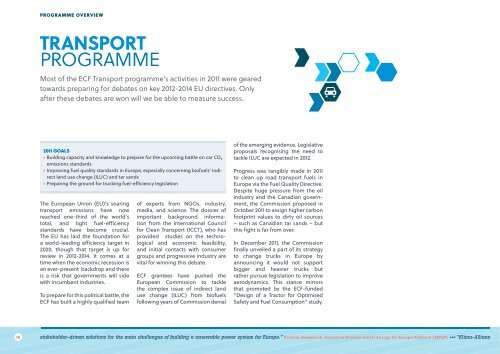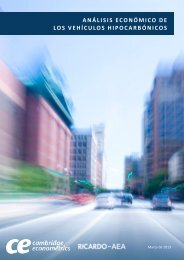ECF 2011 Annual Report - European Climate Foundation
ECF 2011 Annual Report - European Climate Foundation
ECF 2011 Annual Report - European Climate Foundation
You also want an ePaper? Increase the reach of your titles
YUMPU automatically turns print PDFs into web optimized ePapers that Google loves.
Programme Overview<br />
TRANSPORT<br />
PROGRAMME<br />
Most of the <strong>ECF</strong> Transport programme's activities in <strong>2011</strong> were geared<br />
towards preparing for debates on key 2012-2014 EU directives. Only<br />
after these debates are won will we be able to measure success.<br />
<strong>2011</strong> GOALS<br />
• Building capacity and knowledge to prepare for the upcoming battle on car CO₂<br />
emissions standards<br />
• Improving fuel quality standards in Europe, especially concerning biofuels' indirect<br />
land use change (ILUC) and tar sands<br />
• Preparing the ground for trucking fuel-efficiency legislation<br />
The <strong>European</strong> Union (EU)'s soaring<br />
transport emissions have now<br />
reached one-third of the world’s<br />
total, and tight fuel-efficiency<br />
standards have become crucial.<br />
The EU has laid the foundation for<br />
a world-leading efficiency target in<br />
2020, though that target is up for<br />
review in 2012-2014. It comes at a<br />
time when the economic recession is<br />
an ever-present backdrop and there<br />
is a risk that governments will side<br />
with incumbent industries.<br />
To prepare for this political battle, the<br />
<strong>ECF</strong> has built a highly qualified team<br />
of experts from NGOs, industry,<br />
media, and science. The dossier of<br />
important background information<br />
from the International Council<br />
for Clean Transport (ICCT), who has<br />
provided studies on the technological<br />
and economic feasibility,<br />
and initial contacts with consumer<br />
groups and progressive industry are<br />
vital for winning this debate.<br />
<strong>ECF</strong> grantees have pushed the<br />
<strong>European</strong> Commission to tackle<br />
the complex issue of indirect land<br />
use change (ILUC) from biofuels<br />
following years of Commission denial<br />
of the emerging evidence. Legislative<br />
proposals recognising the need to<br />
tackle ILUC are expected in 2012.<br />
Progress was tangibly made in <strong>2011</strong><br />
to clean up road transport fuels in<br />
Europe via the Fuel Quality Directive.<br />
Despite huge pressure from the oil<br />
industry and the Canadian government,<br />
the Commission proposed in<br />
October <strong>2011</strong> to assign higher carbon<br />
footprint values to dirty oil sources<br />
– such as Canadian tar sands – but<br />
this fight is far from over.<br />
In December <strong>2011</strong>, the Commission<br />
finally unveiled a part of its strategy<br />
to change trucks in Europe by<br />
announcing it would not support<br />
bigger and heavier trucks but<br />
rather pursue legislation to improve<br />
aerodynamics. This stance mirrors<br />
that promoted by the <strong>ECF</strong>-funded<br />
“Design of a Tractor for Optimised<br />
Safety and Fuel Consumption” study.<br />
18<br />
stakeholder-driven solutions for the main challenges of building a renewable power system for Europe.” Kristina Steenbock, Executive Director Smart Energy for Europe Platform (SEFEP)<br />
“Klima-Allianz




